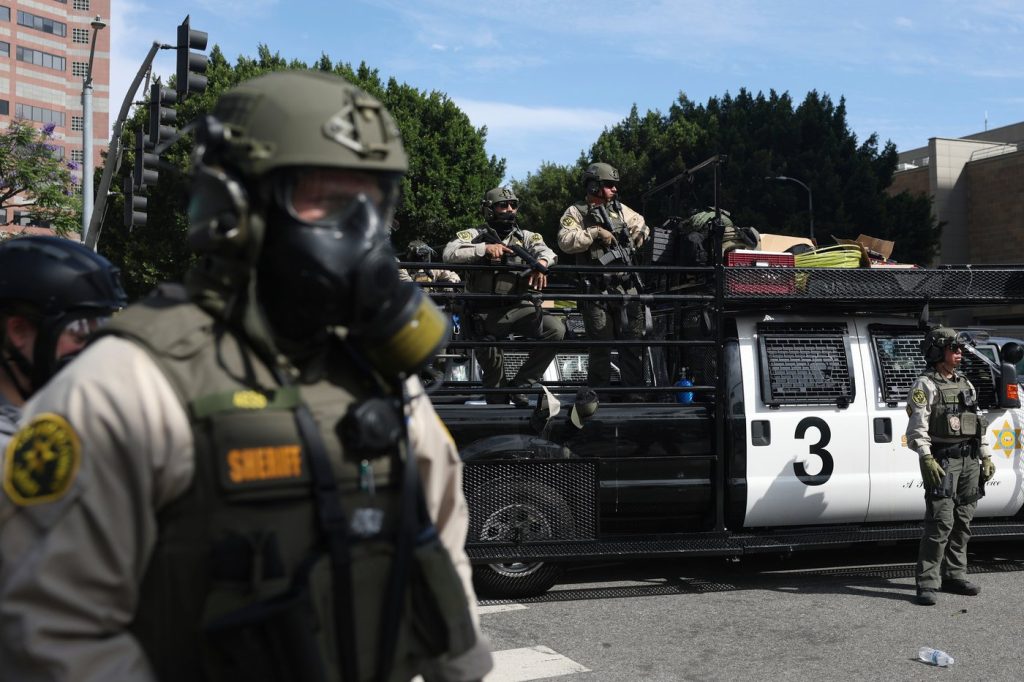LOS ANGELES (AP) – The Trump administration has initiated a lawsuit against California over newly enacted legislation that prohibits federal agents from wearing masks and mandates that they display clear identification while executing their duties within the state. The federal government contends that these policies endanger the safety of officers who are reportedly facing significant harassment and threats.
California's regulations, signed into law by Governor Gavin Newsom in September, mark the state as the first to restrict the use of facial coverings by most law enforcement officials, including federal immigration agents, during official operations. The legislation specifically bans neck gaiters, ski masks, and other forms of face coverings for both local and federal officers but makes allowances for undercover agents, protective gear such as N95 respirators, and does not include state police in its provisions.
In addition to the mask ban, Newsom's administration has introduced a law requiring all law enforcement personnel to wear visible identification that clearly displays their agency and badge number while on duty. The federal law enforcement agencies must comply with issuing a mask policy by July 1, 2026, and a visible identification policy by January 1, 2026.
U.S. Attorney General Pam Bondi expressed that California's laws are discriminatory toward the federal government, asserting that they are designed to endanger federal agents. She emphasized that these laws should not be allowed to remain in effect, reiterating the narrative that federal officers face unprecedented levels of harassment. The lawsuit illustrates that there have been numerous incidents where Immigration and Customs Enforcement (ICE) officers encountered threats, including a notable case involving women accused of following an ICE agent and publicizing her home address on social media.
The lawsuit further argues that allowing federal agents to wear masks is essential for their physical safety. Such protective measures help safeguard their identities amidst the rising threats they face, strengthening their security during official operations.
Governor Newsom has publicly criticized the actions of masked federal agents conducting arrests in California, describing them as "dystopian." Critics of the laws assert concerns regarding the growing influence of federal agents in local policing, observing that frequently these agents fail to clearly identify themselves during immigration enforcement activities, which creates confusion among the public.
In a response to the federal government's litigation, a spokesperson for the governor's office stated that if the Trump administration prioritized public safety as much as it did in other areas, particularly regarding police accountability and civil rights, the communities would be much safer.
The Federal Bureau of Investigation (FBI) has also weighed in on the debate, issuing a memo to law enforcement bodies nationwide advocating for officers to have visible identification while on duty. This guidance follows multiple instances in which masked perpetrators masquerading as immigration officers committed crimes such as robbery and kidnapping.
The federal lawsuit argues that California's mask and identification laws infringe upon the Supremacy Clause of the Constitution, which prohibits states from imposing regulations on the federal government. The laws, as outlined, specifically impose differential treatment against federal officers, while exempting state police from similar requirements.
California Attorney General Rob Bonta’s office is currently conducting a review of the complaint filed by the federal government. Bonta's office has stated that it is concerning when residents struggle to distinguish between legitimate law enforcement officers aimed at providing protection and criminals attempting to inflict harm.
In summary, the legal battle between the federal government and California highlights ongoing tensions regarding law enforcement practices, civil rights, and public safety within the context of federal and state law relations.











